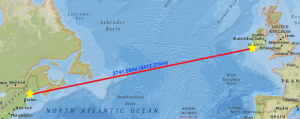
Mar 23, 2017 | Feature |
By Sarita Crandall, Contributing Writer

UMF Biology Major and artist Hailey Mealey. (Photo Courtesy of Facebook).
Hailey Mealey, a junior biology major, has decided to put her artistic talents to work by opening up an Etsy shop to sell her creative watercolor paintings. Since Mealey is paying for her own education and is going to school full time, she needed an extra boost in her financial life and thought using her own abilities would do the trick.
“I was really nervous when I first opened up my Etsy shop because there wasn’t a lot on it,” Mealey said, “but I got a notification on my phone, it makes a little cha-ching, and so when I got that I was so excited someone had bought this portrait I did!”
Mealey’s biggest seller, compared to her printable downloads, are the colorful portraits that she replicates using a photo of your choice. The customer has to provide the photo either via email or through the mail if the customer lives far away they can physically give the photo to Mealey if they live close by.
Bill Charles was a recent local customer that was genuinely pleased with the portrait he paid for. The photo Charles gave Mealey was a photo of a family trip to Canada. “It’s a very memorable time so to have that personalized portrait really means a lot to me and adds to the significance of that trip,” said Charles, “It really has it’s own memory when looking at it.”
Not only has Mealey been working on her artwork to satisfy her customers, but she is working hard in school. One of her professors, Jean Doty, is especially pleased with Mealey in the classroom.
“I’ve known Hailey since the beginning of the fall semester. She took my Cell Biology class in the fall, and she’s currently taking my Genetics course,” Doty said, “Hailey is very enthusiastic and engaged in my classes. And she has excellent lab skills!”

Bernie Sanders watercolor painting by Hailey Jane Creations. (Photo Courtesy of Etsy)
Most people are confused when they hear that Mealey is an artist but also is highly interested in science, especially biology. “I have a lot of diverse interests,” Mealey said, “I think that’s what is good about both artist and scientist is that they’re more diverse than people give them credit to be.” Mealey said.
Doty agrees with Mealey, “Science requires creativity, too, though, so it makes sense that she’s interested in both art and science.”
This past break Mealey went to MDI to spend the entire week looking through microscopes at worms and learning about organisms through multiple bio labs. While she was there she learned a lot about the other students and professors. One professor was in a cover band for Metallica!
“Sometimes I feel like there are stereotypes of both artist and biologist and I think people don’t realize how common it is for the two to mix,” Mealey said, “Dr. Sherrod is my chemistry teacher and he does theater and singing.”
For further information about Mealey and her artwork, visit Etsy.com, search “Hailey Jane Creations” and view her unique work.

Mar 9, 2017 | Feature |
By Nick Bray, Staff Reporter

The lobster tag belonging to Coneth Murray (Photo Courtesy of Caroline Farrell).
A lobster trap tag originating in Southport, Maine was recently found on a beach in Kerry, Ireland. The tag belonged to Coneth Murray, a lifelong lobsterman. Murray is the grandfather of Jess Murray, a senior at UMF.
Facebook has helped create a global lost and found, where objects which drift across the Atlantic ocean can be returned to their rightful owner with ease. The typical beachcomber might discover many artifacts from the fishing industry, and disregard them as they are so ubiquitous.
But Caroline Farrell wasn’t so quick to dismiss the common item when she came across the Mainer’s tag last month. Farrell was walking on Glenbeigh beach in Kerry with her boyfriend when they spotted the tag.
“My boyfriend does beachcombing from time to time,” Farrell said. “He has a keen eye and knows where to look for things on the beach.” Something orange caught Farrell’s eye, she picked it up and her boyfriend explained to her that it was a lobster trap tag. She immediately noticed the name Coneth Murray, printed on the tag. She was intrigued as her grandmother was a Murray and she wondered if there was any relation to this Murray.
Her boyfriend had found these tags in the past and recommended that Farrell post an image of the trap tag on the “Lost at Sea” Facebook group to find out if anyone had a connection to Coneth Murray. “Lost at Sea” is a page where people from across the world post images of things they find washed up on the beach. The group has over 6,000 members posting anything from messages in a bottle, to coins, fishing equipment, and unknown objects that users post in hopes of having the community identify the object.

A map showing the journey of the lobster tag. (Photo Courtesy of Nick Bray)
It was within hours of Farrell posting the trap tag that Jess Murray found it, and contacted Farrell. Murray’s cousin was a member of the “Lost at Sea” page and noticed Farrell’s post just hours earlier in the day. “I just clicked on her name and messaged her,” Murray said. Murray explained to Farrell that her grandfather stopped lobstering in 2001, and passed away in 2009. That means that the lobster tag was likely lost at sea for at least 16 years, if not longer.
Murray comes from a long line of lobstermen. Both her father and grandfather have been lifelong fisherman. “My grandfather lived and breathed lobstering,” Murray said. Coneth Murray was the captain and owner of the Donna Marie, the lobster boat he named after his wife. Murray’s family were very surprised to hear about this find. “My grandmother cried,” Murray said. Farrell said that she will be mailing the tag out as soon as she could and Murray will be receiving it soon.
Murray’s family is of Irish ancestry, and her parents plan on visiting Ireland this summer. They intend on visiting Glenbeigh beach where the tag was found, 2,700 miles away from Southport. The warm waters of the Gulf Stream current pass along the coast of the eastern United States, and crosses the Atlantic ocean becoming the North Atlantic current, eventually passing along the west coast of Ireland, where Glenbeigh beach is located. The tag likely become detached from Coneth Murray’s trap almost two decades ago, became lost at sea for some time, travelled with the current, resurfaced in Ireland, and is now returning to Maine after a very long journey.
Mar 9, 2017 | Feature |
By Sarah Williams, Assistant Editor
Casually dressed for the in person interview in a button down black shirt and jeans, Jonny Islieb knows where he is at. Working four days a week while attending UMF full-time, as well as being a member of the Rugby team, Islieb leads a busy life.
Islieb talked about his active lifestyle and how he balances everything while remaining sane. “I’m in my fourth year, business economics,” he explained, “I’m interested in helping small and local businesses compete on a larger scale so they have more room for growth in their community.” Said Islieb, “Right now I am in Managerial Economics. It’s a senior class it’s pretty intense. I do about 2-3 hours studying per night for my classes.” Islieb went on to talk about a philosophy class he is taking which turned out to be quite interesting for him. “We are talking about the difference between science and religion and social context.”
Living off campus with roommates, Islieb also works at U.S.Cellular part time as a retail sales associate. “I started there in July, after working at The Roost, a local pub, for a little over a year. I’m a sales consultant. I love my job.” He expanded saying, “It’s definitely difficult getting into a routine with work and school, but once you get a schedule it’s easy to manage.” He admitted that last semester he did work full time and it took away from his being able to play rugby. “So I’m excited to take more days off and get back into the sport,” he said enthusiastically.
”I play rugby, this will be my fourth season playing. A few guys recruited me and I went to some of the practices and I fell in love with it.” Islieb said they meet a few times per week and have two tournaments this coming Spring. They are The Maine Cup in Portland sometime in May, and Beast of the East, April 22 and 23 in Portsmouth, Rhode Island. “I play fourteen, which is the wing.” He said rugby is like a mixture of football and soccer with the physical aspects of football but the nonstop pace of soccer. Islieb then echoed a famous quote by Winston Churchill, “Rugby, a hooligans sport played by gentlemen.”
“I grew up in Willimantic, Connecticut. I went to a really small public school where I played basketball and I was in a band for awhile playing guitar a few years.” Islieb went on saying he played punk rock, and that he still played guitar as well as piano.
Islieb has big plans for the future. “Eventually I want to move out west and start my own business someday. I want to explore and see what the country has to offer.” He explained that he had been to California when he was younger and liked it. “I want to start a fitness center and a recording studio.” In his free time he likes to play music. On a final note he mentioned his favorite eats. “Burritos and breakfast sandwiches, l live off them.”

Feb 17, 2017 | Feature |
By Lindsay Mower, Staff Reporter & Layout Editor

Andy Keirns, Manager of Java Joe’s (Photo by Sarah Kosowan)
If you have ever been to Java Joe’s in downtown Farmington, you’ve probably ordered your bagel with speciality cream cheese from a man wearing a plain t-shirt (occasionally a sweatshirt with a few stripes) and a pair of jeans. This is Andy Keirns. He’s most likely had a conversation with you that’s left your head spinning as you’ve reimagined your own existence in the universe, though chances are, given his humble nature, you don’t know much about Keirns himself.
Andy Keirns has been working at Java’s long enough to see more than a couple rotations of Farmington’s flux of college students. The story of the man behind the counter, established in Farmington in 2002, becomes infinitely more interesting when peering into his life outside the coffee shop: an artist, a farmer, a musician, a phenomenal writer and composer, a storyteller and an advocate for the universe; the legend of Keirns, intricate and inspirational, is a tale that must be told.
A native of Tiverton, Rhode Island, Keirns grew up with what he describes as a “relatively unmemorable childhood experience,” spending most of his time in areas of Southern Massachusetts like Fall River and New Bedford, engrossed in the hardcore metal scene that he and his friends fell into during their later teen years. Describing the ‘Technical Death Metal’ music he listened to as incorporating elements of jazz fusion and math rock to make a brutally interesting sound, Keirns added a disclaimer; “The violence that comes along with a live show is not interesting to me… Violence is stupid. The culture in a lot of ways is inherently ignorant— not the music.” Around this time in Keirns’ youth is when he started drinking alcohol. “I was just like drunk all the time. And nobody can tell when you’re 18 or 19 because that’s what kids do.”
How Keirns found himself in Farmington is rather simple: he came to study at UMF with hopes of being a social studies teacher. “I live social sciences; walking around, going to work… I live in this kind of sociological, anthropological world where I just get to observe everything and make comments about the world around me.”
Describing his struggle with academics Keirns says, “I made it to my senior year, but I was in my senior year for three years. I was not equipped for school, I wasn’t ready emotionally. I’m sure I was a pain in the ass for all my teachers and my advisors.” Transitioning into being a part time student in 2004 he started working at Java’s, until 2007 when he decided to take some time off from school. “Life was really, really hard for me… I was really depressed,” he said, “If I wasn’t at work I would be at my apartment with the shades drawn, drunk. And it continued to get worse.”
It wouldn’t be until 2012 that Keirns quit drinking. “When I finally woke up at 28 years old, I was still 18 in a lot of ways,” he said. His means of survival was to keep busy and to avoid his apartment covered in booze bottles. “Everyday after work, I’d go down to the river, I’d like speed walk the loop a couple of times and then I would sit and read a book until I could not bear to just be sitting and reading anymore,” he said, “that was how I got through the first few weeks.”
In addition to his time at Java’s, he also began working for a woman named Deborah Chadbourne who needed help on her farm in Freeman. “It’s an interesting story because it’s two people who have very, very little in common, who were brought together by her farm.” Expressing his deep admiration for Deborah given her instrumental role in his recovery, Keirns says, “It wasn’t just the soil, it was Deborah’s soil… Farming is really great for a person who was in my situation.”
With the positive impact of physical labor on his well being, Keirns also developed a new form of self expression. He decided he no longer wanted to be defined by what he wore and that he “just wanted to be,” so he cleaned his entire apartment and got a new wardrobe, featuring only plain clothes. He also began writing a concept album entitled ‘Bridges Between.’ Using a combination of software synthesizers and live performance, he developed a new sound with an “intentionally cheesy and un-self aware feel” that he dubbed ‘Theatrical Space Metal.’ Keirns’ music is the perfect tool for understanding the complexity of his own mind. ‘Bridges Between’ is a sci fi/fantasy project about an interdimensional alien who realizes it’s not only sentient, but capable of altering the fabric of reality and creating universal empathy and utopia by connecting the global community under a single consciousness, with the intention of evolving humanity to be closer to god. “It’s a work in progress,” Keirns says, “It’s not just an idea. It’s something I got very, very far into.”
Today, this is the story Keirns has to tell. “I can’t shut my mouth about the drinking, the alcohol and about my experience with getting sober,” he said with slight laugh, “it’s just unfortunately how I define myself.” Expressing his gratitude for never being fired from Java’s through his struggle with alcohol addiction, he says he still creates music, a gift that sobriety has granted him, although it’s currently on hold while the house he just bought is under renovation. Unabashedly admitting that he’s still learning, he says, “Now I have to live in the same community that I used to live in, trying to prove to myself and the world around me that I am not who I was.”
Keirns tried finishing school by taking one class at a time, but with only three classes remaining he never did graduate; today finishing school is not on his agenda. “My college education in some ways, I guess, was a waste,” he said, “but everything that has happened has led us to where we are.”
Keirns isn’t your average (Java) Joe; he has seen a lot go down in this tiny Western Maine town. His story needs to be heard, especially by the ears of all millennials finding themselves in a drinking culture that disregards alcohol abuse as a serious and realistic health issue; in particular, the dangers of binge drinking. His voice is that of a complex American hero, one of many facing common hurdles of the modern age, but more importantly his is the voice of one who has pulled their life together and is now reaching out to share their story with others.
As you thank him for ringing up your cup of coffee in the morning, make sure to take the time to absorb and appreciate the gems of wisdom within each story he gifts you. After all, as Keirns likes to say, “We take for granted things that are supposed to be.”




